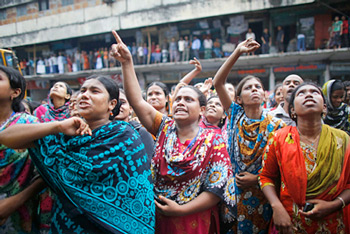(lead article)
Garment workers fill streets in Bangladesh
Demand double minimum wage, job safety

|
|
Reuters/Andrew Biraj
|
|
Garment workers in front of Brothers Fashion in Dhaka, Bangladesh, Sept. 23 call on workers to join protest strike demanding $103 monthly minimum wage and safety protections.
|
BY EMMA JOHNSON
In their largest protest so far, 50,000 garment workers in Bangladesh took to the streets Sept. 21 in Dhaka, the capital, demanding a more than doubling of the minimum wage and safer workplaces.
The demonstration takes place as workers in the industry are stepping up efforts to organize unions in face of fierce resistance and harassment from the bosses.
“We are pressed with our backs against the wall, so we need to raise our voice strongly,” Nazma Akter, president of United Garment Workers Federation, said in a phone interview Sept. 23 from Dhaka. The federation of 52 garment workers groups organized the demonstration.
“The economy moves on the backs of our labor and we are not backing off,” Akter said. “We need the increase to keep up with inflation. The rent for one room is often $35 a month and workers have to share.” The minimum wage is $38 a month. The average is roughly $15 above that. Workers are demanding a raise to $103 minimum, while garment bosses offer a 20 percent increase.
Owners of some 300 factories on the northern outskirts of Dhaka had to shut down production on the day of the demonstration after more than 10,000 workers left the plants.
During the ensuing days, thousands of workers continued street actions, clashing with cops who used tear gas to disperse them. A police source told Agence France-Presse Sept. 23 that “up to 200,000 workers” joined the latest demonstrations, forcing the shutdown of hundreds of factories.
Stepped-up union organizing
Only a tiny fraction of Bangladesh’s 5,000 garment factories have unions. To establish one legally requires that 30 percent of a workforce sign up.
According to Alonzo Suson, Bangladesh director of the AFL-CIO-sponsored Solidarity Center, the number of applications has been increasing. So far this year, out of 90 submitted applications 50 unions have been registered and 29 are pending. In 2010 there was one application, in 2011 nine, in 2012 a few more. Most were rejected.
“We have registered eight new unions in the last few months and have three pending,” Amirul Haque Amin, president of the National Garment Workers Federation, said Sept. 21 by phone from Dhaka. “Our members have faced problems in several factories. One typical example: The government approved the registration, members elected a president, management fired him. So now we have to apply again.”
According to Amin, the country’s labor law gives factory owners the right to fire workers without any stated reason, which gives them a green light to get rid of and blacklist union supporters.
“So far we have mainly registered factories from 1,000 up to 3,000 workers, now we need to move on to the bigger ones,” he said.
Harassment, intimidation and brutality from the police and company-hired goons is nothing new to union organizers in Bangladesh. In April 2012 union leader Aminul Islam was tortured and killed in Dhaka. Others have been framed up and imprisoned.
“At Sadia Garments here, a factory of 300, the government registered the union May 16,” Babul Akhter, president of the Bangladesh Garment and Industrial Workers Federation, said by phone from Dhaka. “After two weeks management escalated their anti-union campaign.”
On June 22 a supervisor attacked the Sadia union’s general secretary, Maksuda Begum, with cutting shears on her back, chest and hands. Management then dragged her away and forced her and the other union committee members to announce their immediate resignation.
“The union is functioning perfectly, everything is now going well,” Nasir Majumder, managing director of Sadia Garments, told the Wall Street Journal Sept. 11. He claimed no one was fired for organizing, but conceded that few of the workers who had led the union still worked there. “Workers leave all the time.” He said photographs shown to him by the Journal of Begum’s injuries were fake, “art work.”
Amendment of labor law
On July 15, Parliament amended the labor law in response to mass protests and political pressures after more than 1,100 workers were killed when Rana Plaza — a shoddy eight-story building housing five garment shops in Savar, 20 miles from Dhaka — collapsed April 24. One amendment bars the government from turning over names of union organizers to the bosses.
Referring to the Rana Plaza collapse, the European Union in a July 8 statement said that a new labor law strengthening workers’ rights must be in place in Bangladesh by the end of 2013 or the country will lose its duty-free access to EU countries.
President Barack Obama announced June 27 the U.S. decision to suspend duty-free imports from Bangladesh, a move backed by the AFL-CIO.
Participants in the Sept. 21 rally opposed taking away the duty-free status of Bangladesh exports, according to Nazma Akter.
“We are part of an international fight, we put pressure on the companies here to improve the conditions for workers,” Akter said. “Revoking the duty-free status doesn’t help us. We need for workers in Europe and the U.S. to put pressure on the big retailers to increase wages and working conditions here.”
Bangladesh’s 5,000 garment factories generate 80 percent of the country’s export income. It is the second biggest exporter of garments in the world after China. Over the last two decades the garment workforce has grown from 1 million to 4 million, the big majority women from rural areas.
After the recent slaughter of so many Bangladeshi garment workers on the altar of profit, big-business media speculated that U.S. and European garment suppliers would cut business ties with Bangladesh. But the country still has the fastest growing garment production in the world
Related articles:
Wash. berry pickers fight for dignity, wages, union
On the Picket Line
Home |
Text-version home
| 


